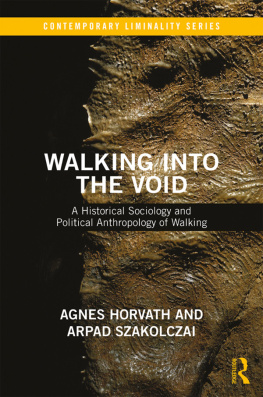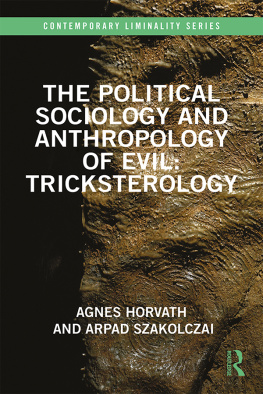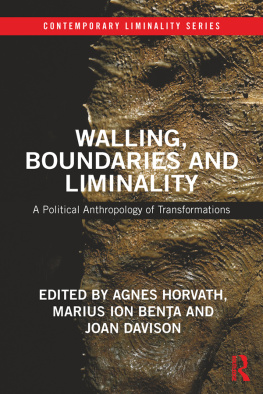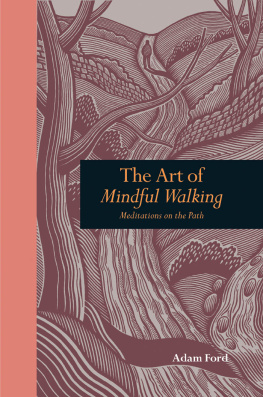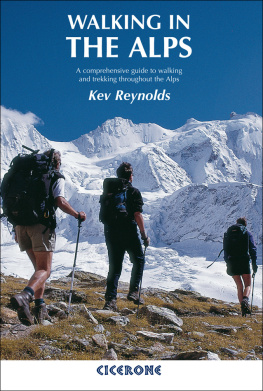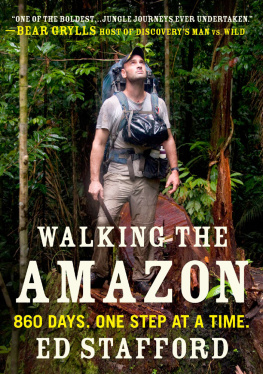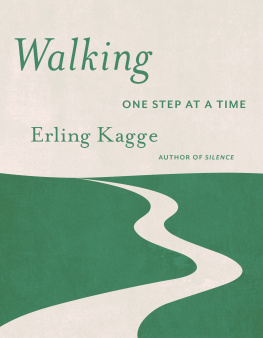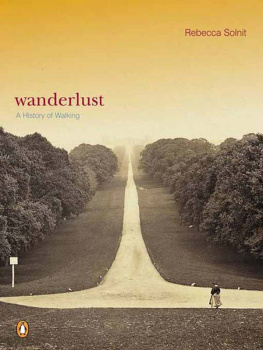
p.i
Walking into the Void by Agnes Horvath and Arpad Szakolczai is one of the most beautiful and fascinating books ever written on walking. Walking is outlined as much more than a means of transportation, or an activity among others. It is an experience ; an experience that intensifies our aesthetic relationship to the world, hollowing that essential void out of which forms and meanings become ordered. In this book, the most archaic conditions of our culture are the subject of investigation, at the same time as the transgression of modernity is exposed as a disaster.
Frdric Gros, Professor of Political Philosophy, SciencesPo, Paris, editor of the Collge de France lectures of Michel Foucault, author of A Philosophy of Walking.
This book is a tour de force; a beautiful, poetic, scholarly and sensitive archaeology of walking in human history that builds upon the authors experience of walking together and their combined theoretical and methodological body of work - a meeting of historical sociology and political anthropology to walk the reader back towards ourselves. A must-read for all interested in walking as experience, practice, method, art, and pilgrimage.
Maggie ONeill, Chair in Sociology/Criminology, University of York, UK.
p.iii
WALKING INTO THE VOID
The book starts by discussing the significance of walking for the experience of being human, including a comparative study of the language and cultures of walking. It then reviews in detail, relying on archaeology, two turning points of human history: the emergence of cave art sanctuaries and a new cultural practice of long-distance pilgrimages, implying a descent into such caves, thus literally the void; and the abandonment of walking culture through settlement at the end of the Ice Age, around the time when the visiting of cave sanctuaries also stopped. The rise of philosophy and Christianity is then presented as two returns to walking. The book closes by looking at the ambivalent relationship of contemporary modernity to walking, where its radical abandonment is combined with attempts at returns.
The book ventures an unprecedented genealogy of walking culture, bringing together archaeological studies distant in both time and place, and having a special focus on the significance of the rise of representative art for human history. Our genealogy helped to identify settlement not as the glorious origin of civilisation, but rather as a source of an extremely problematic development. The findings of the book should be relevant for social scientists, as well as those interested in walking and its cultural and civilisational significance, or in the direction and meaning of human history.
Agnes Horvath is a visiting research fellow at the Centre for the Study of the Moral Foundations of Economy and Society, University College Cork, Ireland. She has a Doctorate in Law (ELTE, Budapest, 1981), an MA in Sociology (University of Economics, Budapest, 1988) and a PhD in Social and Political Sciences (European University Institute, Florence, 2000). Horvath has published books and articles in English, French, Italian and Hungarian, including Modernism and Charisma (Palgrave, 2013), Breaking Boundaries: Varieties of Liminality (Berghahn, 2015, with Bjrn Thomassen and Harald Wydra) and The Dissolution of Communist Power: The Case of Hungary (Routledge, 1992, with Arpad Szakolczai). She also co-edited a special section on The Gravity of Eros in the Contemporary in the December 2013 issue of History of Human Sciences , and co-edited a special issue on The Political Anthropology of Ethnic and Religious Minorities for Nationalism and Ethnic Politics (Routledge, March 2017). She is one of the founding editors of the peer-reviewed academic journal International Political Anthropology .
p.iv
Arpad Szakolczai is Professor of Sociology at University College Cork. His books include La scoperta della societ (Carocci, 2003, with Giovanna Procacci) as well as Max Weber and Michel Foucault: Parallel Life-Works (1998), Reflexive Historical Sociology (2000), The Genesis of Modernity (2003), Sociology, Religion and Grace: A Quest for the Renaissance (2007), Novels and the Sociology of the Contemporary (2016), Permanent Liminality and Modernity (2017) and Comedy and the Public Sphere: The Re-birth of Theatre as Comedy and the Genealogy of the Modern Public Arena (2013), all published by Routledge. He has published articles in the American Journal of Sociology , Theory, Culture and Society , Cultural Sociology , Current Sociology , History of the Human Sciences , the European Journal of Social Theory , International Sociology , the British Journal of Political Science , East European Politics and Societies , the European Sociological Review , the British Journal of Sociolog y and International Political Anthropology .
p.v
Contemporary Liminality
https://www.routledge.com/sociology/series/ASHSER1435
Series editor:
Arpad Szakolczai, University College Cork, Ireland
Series advisory board:
Agnes Horvath, University College Cork, Ireland
Bjrn Thomassen, Roskilde University, Denmark
Harald Wydra, University of Cambridge, UK
This series constitutes a forum for works that make use of concepts such as imitation, trickster or schismogenesis, but which chiefly deploy the notion of liminality, as the basis of a new, anthropologically focused paradigm in social theory. With its versatility and range of possible uses rivalling and even going beyond mainstream concepts such as system, structure or institution, liminality is increasingly considered a new master concept that promises to spark a renewal in social thought.
In spite of the fact that charges of Eurocentrism or even moderno-centrism are widely discussed in sociology and anthropology, it remains the case that most theoretical tools in the social sciences continue to rely on taken-for-granted approaches developed from within the modern Western intellectual tradition, whilst concepts developed on the basis of extensive anthropological evidence and which challenged commonplaces of modernist thinking have been either marginalised and ignored or trivialised. By challenging the assumed neo-Kantian and neo-Hegelian foundations of modern social theory, and by helping to shed new light on the fundamental ideas of major figures in social theory, such as Nietzsche, Dilthey, Weber, Elias, Voegelin, Foucault and Koselleck, whilst also establishing connections between the perspectives gained through modern social and cultural anthropology and the central concerns of classical philosophical anthropology, Contemporary Liminality offers a new direction in social thought.
Titles in this series
1. Permanent Liminality and Modernity
Analysing the Sacrificial Carnival through Novels
Arpad Szakolczai
2. Power, Legitimacy and the Public Sphere
The Iranian Taziyeh Theatre Ritual
Amin Sharifi Isaloo
3. Walking into the Void
A Historical Sociology and Political Anthropology of Walking
Agnes Horvath and Arpad Szakolczai
p.vii
WALKING INTO THE
VOID
A Historical Sociology and Political
Anthropology of Walking
Agnes Horvath and Arpad Szakolczai

p.viii
First published 2018
by Routledge
2 Park Square, Milton Park, Abingdon, Oxon OX14 4RN
and by Routledge
711 Third Avenue, New York, NY 10017
Routledge is an imprint of the Taylor & Francis Group, an informa business
2018 Agnes Horvath and Arpad Szakolczai
The right of Agnes Horvath and Arpad Szakolczai to be identified as authors of this work has been asserted by them in accordance with sections 77 and 78 of the Copyright, Designs and Patents Act 1988.
Next page
